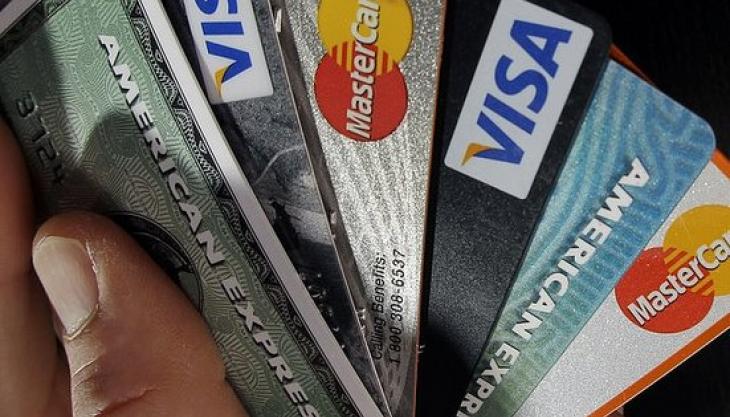5 Myths About Your Credit Score – Don’t Let Misinformation Tank Your FICO
Submitted by Rachel R on Mon, 09/14/2015 - 10:43am

Credit cards can help or hurt your FICO score
Image Source: Flickr User Mighty Travels
We all know that having a high credit score is a good thing, but many people misunderstand how to get their credit score up and how to keep it there. There’s a lot of misinformation out there. Personal finance classes in high school teach that good credit is the goal, but don’t offer practical information on how to get there. Millennials, in particular, are taking on credit without a clear idea of how to best manage their debt to optimize their credit scores. And your FICO score determines how much you’ll pay for critical services like homeowner’s and auto insurance and what interest rate you can get for a mortgage or auto loan. Today we’ll dispel five myths about credit scores.
#1 High credit card balances are okay if you pay on time
Many people assume that so long as they pay their credit card bill on time each month and pay the minimum payment (or more), they’re in good shape. This is decidedly untrue. Experian released recent research that shows that Millennials average 43% utilization of their available credit card limits. While this may seem acceptable because they are not close to maxing out their cards, it’s not. Using more than 30% of your total credit limit will cause your score to drop each month, even if you’re paying on time.
#2 Clearing up items in collection will help your credit score
If you are delinquent on any account, the creditor can put it into collections. When this happens, the collections agency adds a second entry to your credit report. That means two negative entries. Many consumers assume that paying that account in collection will clear it up. It won’t. If your money is tight, you’re better off catching up late accounts that have not yet gone into collections than dealing with accounts already in collection. Keeping accounts out of collection will greatly benefit your FICO score.
#3 You need high income to have good credit
Your income is not part of your credit score calculation, only your credit utilization, types of credit, payment history and that type of information. You can have good credit at any income level so long as you pay your bills promptly, have credit accounts that are in good standing and don’t exceed 30% of your revolving credit limits. For those with lower income, a low limit credit card can be a good fit so long as you use it but don’t abuse it. Income does not drive credit score, rest assured.
#4 Closing out credit cards will improve your score
If you get a new, lower interest credit card, you may go ahead and close out a higher interest card. That action, no matter how logical it seems, can lower your credit score. A big part of the FICO score is the utilization of available credit, and you also get a boost from older accounts that are still in good standing. Keep your older accounts but you also need to keep them active. An easy way to do this is to set up a small monthly charge like Netflix then put the card on auto-pay, so it stays active and is paid on time.
#5 Your credit score is in good standing
If you always pay your bills on time and don’t max out your cards, you may assume that your credit score is just fine. This is a dangerous myth. You need to monitor your credit regularly – twice a year at a minimum. Inaccurate reporting by creditors can tank your score, and you would have no idea unless you check your score – or find out when you’re denied credit. Identity theft can result in major damage to your report, and you may not know unless you check your score. Don’t assume things are fine.
If you’re struggling with debt, living paycheck to paycheck, maxed out on credit lines and not sure how to get out of the mess, North Carolina bankruptcy may be the solution you need. Contact the Law Offices of John T. Orcutt for a free consultation on Chapter 7 or Chapter 13 bankruptcy to get the financial fresh start you deserve. Call +1-833-627-0115 for a bankruptcy consultation in Raleigh, Durham, Fayetteville, Wilson, Greensboro or Wilmington.
Sources:
Debts Hurt! Got debt? Need help? Get started below!
Serving All of North Carolina
- Bankruptcy Attorneys Raleigh NC (North)
- Bankruptcy Attorney Fayetteville NC
- Bankruptcy Attorney Durham NC
- Bankruptcy Attorneys Wilson NC
- Bankruptcy Attorneys Greensboro NC
- Bankruptcy Attorneys Southport NC
- Bankruptcy Attorneys Wilmington NC
Bankruptcy Attorneys Raleigh NC (North)
6616 Six Forks Rd #203 Raleigh, NC 27615 North Carolina
Tel: (919) 847-9750

Bankruptcy Attorney Fayetteville NC
2711 Breezewood Ave Fayetteville, NC 28303 North Carolina
Tel: (910) 323-2972

Bankruptcy Attorney Durham NC
1738 Hillandale Rd Suite D Durham, NC 27705 North Carolina
Tel: (919) 286-1695


Bankruptcy Attorneys Greensboro NC
2100 W Cornwallis Dr. STE O Greensboro, NC 27408 North Carolina
Tel: (336) 542-5993

Bankruptcy Attorneys Southport NC
116 N Howe St. Suite A Southport, NC 28461 North Carolina
Tel: (910) 218-8682

Bankruptcy Attorneys Wilmington NC
116 N. Howe Street, Suite A Southport, NC 28461 North Carolina
Tel: (910) 447-2987
